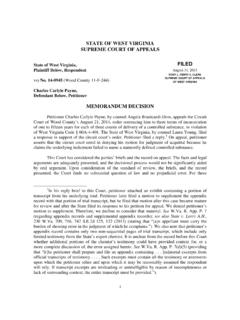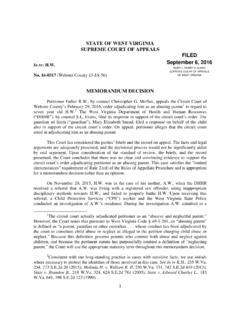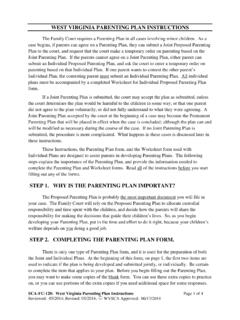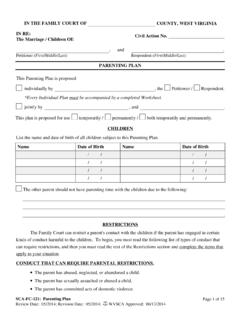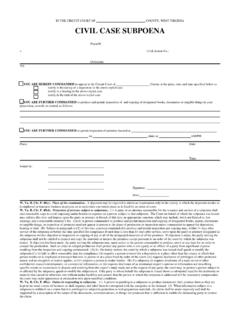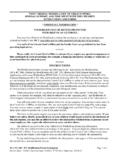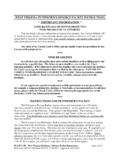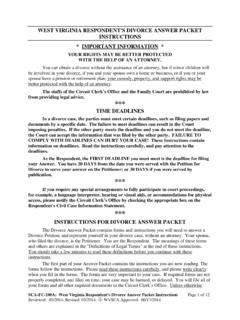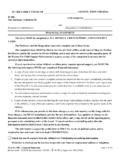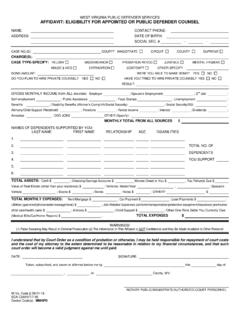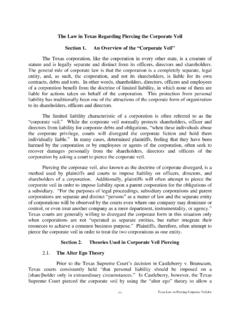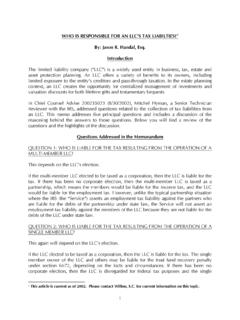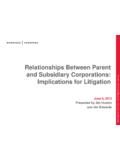Transcription of STATE OF WEST VIRGINIA SUPREME COURT OF …
1 STATE OF west VIRGINIA SUPREME COURT OF APPEALS A2C2 Partnership, LLC, FILED Plaintiff Below, Petitioner October 16, 2015 vs) No. 14-0960 (Kanawha County 12-C-2572) RORY L. PERRY II, CLERK SUPREME COURT OF APPEALS OF west VIRGINIA Constellation Software Inc., Defendant Below, Respondent MEMORANDUM DECISION Petitioner A2C2 Partnership, LLC, by counsel Michael D.
2 Weikle, appeals the order of the Circuit COURT of Kanawha County, entered on August 19, 2014, granting respondent s motion to dismiss petitioner s complaint for lack of jurisdiction, improper venue, and failure to STATE a claim upon which relief can be granted. Respondent Constellation Software Inc., by counsel Carol P. Smith, filed a response. Petitioner filed a reply, to which respondent, with permission of this COURT , filed a sur-reply. This COURT has considered the parties briefs and the record on appeal. The facts and legal arguments are adequately presented, and the decisional process would not be significantly aided by oral argument. Upon consideration of the standard of review, the briefs, and the record presented, the COURT finds no substantial question of law and no prejudicial error. For these reasons, a memorandum decision affirming the circuit COURT s order is appropriate under Rule 21 of the Rules of Appellate Procedure.
3 Petitioner is a west VIRGINIA limited liability company that is authorized to hold and lease property in the STATE of Michigan. Respondent is a Canadian corporation, with its principal place of business in Ontario, Canada. Respondent is a holding company, which owns the stock of its corporate subsidiaries, one of which is Gary Jonas Computing, Ltd. ( Jonas ), located in Richmond Hills, Ontario, This litigation arises from software and web hosting contracts between Jonas and the Ann Arbor Country Club, located in Ann Arbor, Michigan, executed in 2001 and 2005, respectively. Ann Arbor Country Club was placed in receivership in 2010, and petitioner acquired its assets in February of 2011. Petitioner stopped paying Jonas for its services, causing Jonas to terminate all 1 Respondent argues, and the circuit COURT found, that respondent has no business presence in west VIRGINIA . Petitioner admits that respondent does not have sufficient minimum contacts with west VIRGINIA to permit the circuit COURT to exercise jurisdiction over it; rather, according to its amended complaint, petitioner contends that the COURT should invoke the alter ego doctrine in order to hold respondent liable for Jonas s actions.
4 1 services to the golf club in November of 2011. Thereafter, petitioner paid Jonas $1,397 for what it alleged was an unconditional promise by Jonas to restore website hosting and maintenance services until March of 2012.
5 After restoring services for a short period, Jonas terminated services for good in January 2012. As a result, petitioner filed the present lawsuit against respondent. Petitioner filed its initial complaint on or around December 28, 2012, alleging eight causes of action solely against respondent. Specifically, petitioner alleged breach of contract, fraud in the inducement, fraud, intentional interference with business relations, intentional interference with prospective business relations, loss of use, and sought both compensatory and punitive damages. The complaint does not allege that there was any direct dealing and/or contract between petitioner and respondent. Respondent filed a motion to dismiss the complaint on February 1, 2013. In response to the motion to dismiss, petitioner filed an amended complaint on May 1, 2013, making the same allegations as in its original complaint, but adding Jonas as a defendant and invoking an alter-ego theory of liability against respondent.
6 Petitioner s allegations supporting its alter-ego theory included the following: (1) respondent manages its subsidiaries, including Jonas, as a single venture controlled by a single board of directors; (2) respondent states on its website that it is a leading provider of software and that acquires, manages, and builds industry-specific software businesses; (3) Jonas has been managed by respondent since 2003 and states on its website that it is a division of respondent; and (4) in addition to the pledge of their assets to respondent, respondent s subsidiaries guaranteed payment of respondent s $300 million line of In its motion to dismiss, respondent argued lack of personal jurisdiction; improper venue because respondent does not reside in west VIRGINIA and no part of the conduct about which petitioner complains occurred in west VIRGINIA ; and failure to STATE a claim upon which relief can be granted because petitioner had no contract with respondent, and respondent owed no duty to petitioner.
7 Following briefing and a hearing, the circuit COURT granted respondent s motion to dismiss on all three grounds by order entered on August 19, 2014. Petitioner now appeals to this COURT . Appellate review of a circuit COURT 's order granting a motion to dismiss a complaint is de novo. Syl. Pt. 2, STATE ex rel. McGraw v. Scott Runyan Pontiac-Buick, Inc., 194 770, 461 516 (1995). A complaint should not be dismissed unless it appears beyond doubt that the plaintiff can prove no set of facts in support of [its] claim which would entitle [it] to relief. Syl. pt. 3, in part, Chapman v. Kane Transfer Co., Inc., 160 530, 236 207 (1977), citing Conley v. Gibson, 355 41, 45-46, 78 99, 102, 2 80, 84 (1957). Conrad v. ARA Szabo, 198 362, 370, 480 801, 809 (1996). 2 Petitioner failed to serve Jonas with the amended complaint, resulting in dismissal of the amended complaint as to the allegations against Jonas pursuant to Rule 4 of the west VIRGINIA Rules of Civil Procedure.
8 Petitioner has not appealed that ruling. 2 With respect to a nonresident defendant s motion to dismiss for lack of personal jurisdiction, we have held that [w]
9 Hen a defendant files a motion to dismiss for lack of personal jurisdiction under 12(b)(2), the circuit COURT may rule on the motion upon the pleadings, affidavits and other documentary evidence or the COURT may permit discovery to aid in its decision. At this stage, the party asserting jurisdiction need only make a prima facie showing of personal jurisdiction in order to survive the motion to dismiss. In determining whether a party has made a prima facie showing of personal jurisdiction, the COURT must view the allegations in the light most favorable to such party, drawing all inferences in favor of jurisdiction. If, however, the COURT conducts a pretrial evidentiary hearing on the motion, or if the personal jurisdiction issue is litigated at trial, the party asserting jurisdiction must prove jurisdiction by a preponderance of the evidence. Syllabus point 4, STATE ex rel. Bell Atlantic west VIRGINIA , Inc.
10 V. Ranson, 201 402, 497 755 (1997). Syl. Pt. 2, Bowers v. Wurzburg, 202 43, 501 479 (1998). Additionally, a trial COURT is free to ignore legal conclusions, unsupported conclusions, unwarranted inferences and sweeping legal conclusions cast in the form of factual allegations. Franklin D. Cleckley, Robin J. Davis, & Louis J. Palmer, Jr., Litigation Handbook on west VIRGINIA Rules of Civil Procedure 12(b)(6)[2], at 386 (4th ed. 2014) (footnote omitted). On appeal, petitioner raises a single assignment of error: that the circuit COURT erred in finding that petitioner failed to allege sufficient facts to warrant piercing the corporate veil of Jonas, respondent s wholly-owned subsidiary, and granting respondent s Rule 12(b)(6) motion to dismiss. Petitioner challenges the circuit COURT s application of the nineteen factors set forth in Laya v. Erin Homes, Inc., 177 343, 352 93 (1986), that this COURT has long held are to be considered in determining whether the corporate veil should be Petitioner 3 These nineteen factors are as follows: (1) commingling of funds and other assets of the corporation with those of the individual shareholders; (2) diversion of the corporation's funds or assets to noncorporate uses (to the personal uses of the corporation's shareholders); (3) failure to maintain the corporate formalities necessary for the issuance of or subscription to the corporation's stock, such as formal approval of the stock issue by the board of directors; (4) an individual shareholder representing to persons outside the corporation that he or she is personally liable for the debts or other obligations of the corporation; (5) failure to maintain corporate minutes or adequate corporate records.
